About Robert L. Cohen: Notes from a Musical Autobiography
Beginnings: LPs & Beethoven Cohen
I grew up on classical (and some folk) music; my mother might as well have had a radio that would bring in only one station — I think they actually made such a contraption at one point — as she never, under any circumstances, moved the radio dial from WQXR, a New York classical music station then owned by the New York Times.
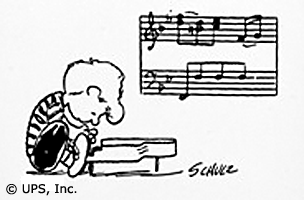 Listening to the radio and to my mother’s long-playing records (LPs, as they were called back then; “vinyl” now) — along with my own fitful piano playing (I was most fond of Mozart’s Sonata in A, K. 331, which eventually turned up on a memorable Twilight Zone episode) — eventually bore fruit when I attended Cornell and became a classical music programmer for our student-owned and -operated commercial classical music radio station, WVBR-FM. I subsequently served as Director of Classical Music for two years: continuing to program the music — including two uninterrupted 10-day “Marathons” during Finals weeks; supervising other programmers; and deciding what records to add to VBR’s library. (The station’s since gone rock, and I do wonder what became of all those LPs I ordered . . .) On the VBR softball team, a Schroeder sweatshirt and my fondness for the Seventh Symphony led to “Beethoven Cohen” becoming my unofficial moniker. Listening to the radio and to my mother’s long-playing records (LPs, as they were called back then; “vinyl” now) — along with my own fitful piano playing (I was most fond of Mozart’s Sonata in A, K. 331, which eventually turned up on a memorable Twilight Zone episode) — eventually bore fruit when I attended Cornell and became a classical music programmer for our student-owned and -operated commercial classical music radio station, WVBR-FM. I subsequently served as Director of Classical Music for two years: continuing to program the music — including two uninterrupted 10-day “Marathons” during Finals weeks; supervising other programmers; and deciding what records to add to VBR’s library. (The station’s since gone rock, and I do wonder what became of all those LPs I ordered . . .) On the VBR softball team, a Schroeder sweatshirt and my fondness for the Seventh Symphony led to “Beethoven Cohen” becoming my unofficial moniker.
On the Air: Friend of the Soul
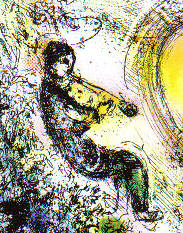 Though I’ve never lost touch with classical music, especially Baroque and chamber music (I love taking in the “Bargemusic” chamber music concerts under the Brooklyn Bridge in New York), in the 60s and 70s I immersed myself in both American folk music and Jewish music — the latter most often itself of a folk (as opposed to a high-art or cantorial) character, and reflecting the twin influences of Hasidic music and American folk music. (The exemplar of this style of spiritual or religious folk music was the late Shlomo Carlebach, z”l, whom I was privileged to know as a teacher and service leader as well as as a composer and musician.) Though I’ve never lost touch with classical music, especially Baroque and chamber music (I love taking in the “Bargemusic” chamber music concerts under the Brooklyn Bridge in New York), in the 60s and 70s I immersed myself in both American folk music and Jewish music — the latter most often itself of a folk (as opposed to a high-art or cantorial) character, and reflecting the twin influences of Hasidic music and American folk music. (The exemplar of this style of spiritual or religious folk music was the late Shlomo Carlebach, z”l, whom I was privileged to know as a teacher and service leader as well as as a composer and musician.)
 I also became increasingly involved in Jewish communal, cultural, and religious activities: studying with Orthodox teachers, involvement in the havurah movement, and active membership in a Jewish arts community called Bet Kafé. Out of all these ingredients, along with a lifelong passion for radio, I created a Jewish radio program on the renascence of Jewish culture and identity which I called Yedid Nefesh [Friend of the Soul], after the name of a beautiful 16th-century piyyut (religious poem) that was also the theme song of our Bet Kafé community. Among other things, I finally got my mother to tune in to a different radio station once a week! I also became increasingly involved in Jewish communal, cultural, and religious activities: studying with Orthodox teachers, involvement in the havurah movement, and active membership in a Jewish arts community called Bet Kafé. Out of all these ingredients, along with a lifelong passion for radio, I created a Jewish radio program on the renascence of Jewish culture and identity which I called Yedid Nefesh [Friend of the Soul], after the name of a beautiful 16th-century piyyut (religious poem) that was also the theme song of our Bet Kafé community. Among other things, I finally got my mother to tune in to a different radio station once a week!
Along with interviews, panel discussions, and special series on the Jewish life-cycle, prayer, Israel, and the arts, the show always featured examples of new Jewish music, mostly from the underappreciated treasure trove of indigenous American Jewish music. My exposure to new Jewish music, and to the composers and musicians creating this music, was one of the most gratifying aspects of the show for me.

NPR
As a result of the success of Yedid Nefesh (which aired in New York City in prime time Sunday evenings for almost four years and was syndicated in a number of other cities), I did a number of other radio shows in New York, including a dozen programs in the legendary Eternal Light series and a number of live, late-night listener call-in programs. Some time thereafter, I was asked by the National Foundation for Jewish Culture to write the script (for Theodore Bikel’s narration) and select all the music for a two-hour radio documentary, “One People, Many Voices: American-Jewish Music Comes of Age.” (The title belonged to three two-hour documentaries covering different eras in the history of Jewish music; I provided the subtitle for my program.) The show aired throughout the country in the spring of 1986; the series won the Corporation for Public Broadcasting 1987 Award for Arts and Humanities and is now archived in the Paley Center for Media (formerly the Museum of Television & Radio) in New York.
On the Road
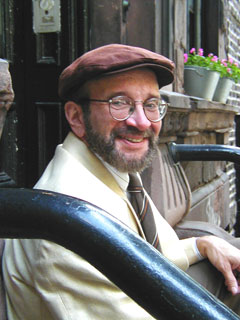 I enjoyed the immersion in research and study (including with Cantor Sherwood Goffin and Hasidic music historian Velvel Pasternak); the interviews with composers and musicians; and (especially) the listening that the NPR documentary required, and realized a while later that there was a time-honored way of continuing that vocation off the air — by taking the show on the road, so to speak, and lecturing on contemporary American-Jewish music. I’ve since delivered several hundred lectures — on contemporary American-Jewish music for prayer, on women in American-Jewish music, and on Hasidic music; on the music of the Psalms and music for the Jewish life-cycle; on “The American-Jewish Immigrant Experience in Song,” on the incorporation of Jewish musical themes into mainstream classical, popular, and folk music, and on musical intersections and cross-fertilization between American-Jewish and African-American music; on klezmer music, and on the Yiddish music of Eastern Europe (then) and America (now); on the music of Israel and Jerusalem; and on old and new music for every point in the Jewish calendar (and some in the American calendar) — and I’ve also conducted interactive workshops on music and prayer. I enjoyed the immersion in research and study (including with Cantor Sherwood Goffin and Hasidic music historian Velvel Pasternak); the interviews with composers and musicians; and (especially) the listening that the NPR documentary required, and realized a while later that there was a time-honored way of continuing that vocation off the air — by taking the show on the road, so to speak, and lecturing on contemporary American-Jewish music. I’ve since delivered several hundred lectures — on contemporary American-Jewish music for prayer, on women in American-Jewish music, and on Hasidic music; on the music of the Psalms and music for the Jewish life-cycle; on “The American-Jewish Immigrant Experience in Song,” on the incorporation of Jewish musical themes into mainstream classical, popular, and folk music, and on musical intersections and cross-fertilization between American-Jewish and African-American music; on klezmer music, and on the Yiddish music of Eastern Europe (then) and America (now); on the music of Israel and Jerusalem; and on old and new music for every point in the Jewish calendar (and some in the American calendar) — and I’ve also conducted interactive workshops on music and prayer.
I’ve had the privilege of speaking before numerous synagogues, Jewish Community Centers (and the 92nd St. Y), elderhostels, college Hillels, and Jewish retreats and as a scholar-in-residence; for audiences of educators and cantors; and at the New York Public Library, the New England Conservatory of Music, the Jewish Theological Seminary, Hebrew College in Boston, the New School in New York, the American Jewish Historical Society, Skidmore College, Queens College, and many other venues. And I’ve enjoyed writing on Jewish music for a number of national magazines; one article (on borrowing melodies for Jewish prayer) won an American Jewish Press Association Rockower Award for Excellence in Arts and Criticism.
The Songs of the City
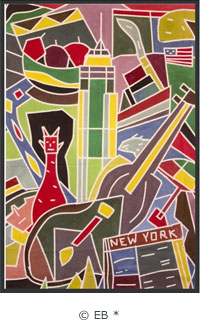 At the New School, I created courses on contemporary Jewish arts and on the medium of radio, and I also conducted a series of mini-courses on what I called The Songs of the City: folk songs, Tin Pan Alley and Broadway classics, and contemporary singer-songwriter creations as well as street-corner “doo wop” harmony singing with roots in New York City life. I was fortunate to have among my classroom guests Pete Seeger, Tom Paxton, Fred Hellerman of the Weavers, Richie Havens, Peter Yarrow, Elizabeth Swados, Rod MacDonald, and Julie Gold, along with a bevy of marvelous Jewish artists and such radio celebrities as “Cousin” Bruce Morrow, Bob Costas, and Don K. Reed. At the New School, I created courses on contemporary Jewish arts and on the medium of radio, and I also conducted a series of mini-courses on what I called The Songs of the City: folk songs, Tin Pan Alley and Broadway classics, and contemporary singer-songwriter creations as well as street-corner “doo wop” harmony singing with roots in New York City life. I was fortunate to have among my classroom guests Pete Seeger, Tom Paxton, Fred Hellerman of the Weavers, Richie Havens, Peter Yarrow, Elizabeth Swados, Rod MacDonald, and Julie Gold, along with a bevy of marvelous Jewish artists and such radio celebrities as “Cousin” Bruce Morrow, Bob Costas, and Don K. Reed.
Beginning in the year 2000, I’ve had the honor of giving talks on both Jewish music and New York City music under the auspices of the Speakers in the Humanities program of the New York Council for the Humanities — and am pleased to have been one of the most successful speakers on their distinguished roster.
Open the Gates!
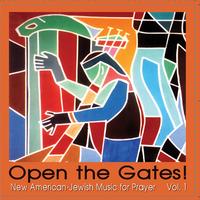 Another gratifying outgrowth of the radio shows and, in turn, the lecturing: Inspired by the composer and musician David Shneyer, I created a compilation CD, entitled Open the Gates! New American-Jewish Music for Prayer, of settings of Jewish liturgy and para-liturgy by 18 different composers and musicians, from Shlomo Carlebach and Debbie Friedman to the Fabrangen Fiddlers (David Shneyer’s band) and the Diaspora Yeshiva Band, and including examples of Jewish bluegrass, Jewish country, and Jewish world music; a cappella settings; and mainstream musicians Elizabeth Swados and Kenny G. I also wrote liner notes and an extended essay setting forth the understanding of American-Jewish music that I’ve been expounding in my lectures. “There are intensely beautiful gems in this collection of Jewish songs,” wrote Peter Yarrow — and as the compiler rather than the composer of this music, I can wholeheartedly respond: He’s right! Another gratifying outgrowth of the radio shows and, in turn, the lecturing: Inspired by the composer and musician David Shneyer, I created a compilation CD, entitled Open the Gates! New American-Jewish Music for Prayer, of settings of Jewish liturgy and para-liturgy by 18 different composers and musicians, from Shlomo Carlebach and Debbie Friedman to the Fabrangen Fiddlers (David Shneyer’s band) and the Diaspora Yeshiva Band, and including examples of Jewish bluegrass, Jewish country, and Jewish world music; a cappella settings; and mainstream musicians Elizabeth Swados and Kenny G. I also wrote liner notes and an extended essay setting forth the understanding of American-Jewish music that I’ve been expounding in my lectures. “There are intensely beautiful gems in this collection of Jewish songs,” wrote Peter Yarrow — and as the compiler rather than the composer of this music, I can wholeheartedly respond: He’s right!
* © Elliot Bassman. Used by permission.
^ to top of page |